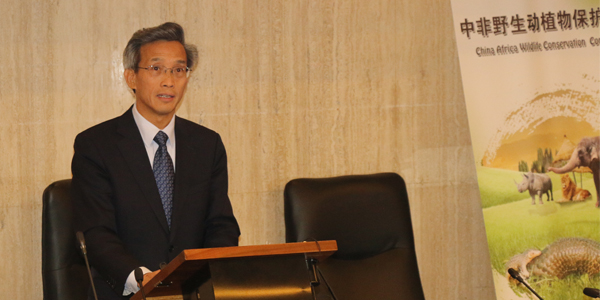China commits to preserving Africa’s wildlife
- Wits University
The Chinese government reiterates its commitment to fighting poaching of rhinos and other animals in Africa.
Africa’s wildlife is under threat with animals such as rhinoceroses facing extinction due to poaching. The surging numbers of rhinos poached in South Africa over the past few years is worrisome. The Chinese government has committed to fighting poaching rhinos and other animals in Africa, which are often exported to Chinese markets.
The Wits Africa-China Reporting Project and partners Global Max Media Group, China Biodiversity Conservation and Green Development Foundation, Nature Guardian Wildlife Conservation Centre and China House hosted the Africa-China Wildlife Conservation Conference at Wits last month which aimed to build a platform for deeper dialogue and intervention between Chinese communities in Africa and wildlife conservation organisations.
The conference, which was attended by wildlife conservation leaders and Chinese community leaders, shed light on what some of the biggest problems in wildlife conservation in Africa are.

Lin Songtian, Ambassador Extraordinary and Plenipotentiary of the People’s Republic of China to the Republic of South Africa delivered the keynote address and reiterated China’s commitment to improving wildlife conservation in Africa and to curbing poaching in Africa.
According to Songtian, one of the reasons behind the spike in poaching numbers and illegal wildlife trade by Chinese communities is a lack of law enforcement. The Chinese government has “zero tolerance” against wildlife crimes and has enforced laws prohibiting smuggling animal products such as ivory, which comes from elephant tusks. Ivory is popular in China and the Chinese government has therefore banned all ivory products in China, he said.
“The Chinese government always attaches great importance to the protection of wildlife. In terms of legislations, the Chinese government has already adopted Methods to Protect Rare Biological Species, the Law on the Protection of Wildlife, Regulations for the Implementation of the Protection of Terrestrial Wildlife, and many other laws and regulations on wildlife protection. In recent years, the Chinese government has implemented major projects on biodiversity protection, tightened administration and control over import and export of wildlife and plants, and cracked down hard on the illegal trade of ivory and other wildlife products,” said Songtian.
As the year 2018 marks the 20th anniversary of China-South Africa diplomatic relations, Songtian said it is important for China to sustain good trade relations with South Africa and to be stern on curbing endangerment of Africa’s wildlife.
“From 2013 to 2015, China has joined forces with South Africa, the United States, Interpol and other countries and organisations to carry out three anti-smuggling endangered species activities, code-named ’Operation Cobra‘, effectively curbing criminal activities such as smuggling ivory. [This has been] praised by the CITES [Convention on International Trade in Endangered Species of Wild Fauna and Flora] Secretary General,” he said.
Songtian noted that poverty was a key factor in poaching as many unemployed people poach animals to make a living. While measures have been put in place to prohibit poaching, this is not enough and poachers need to be economically empowered.
“Poverty is the common enemy of the whole world. It is also the biggest enemy of wildlife conservation. We are extremely saddened that, in certain regions and countries in Africa, many jobless populations are forced to engage in wildlife poaching to make a living. It is true that raising awareness and enhanced law enforcement is important, but for those people, what is more critical is to engage them in normal economic activity through job creation. We believe that we must address both the symptoms and root causes in wildlife conservation,” said Songtian.
Read the full speech of H.E. Ambassador Lin Songtian of China to South Africa here.
